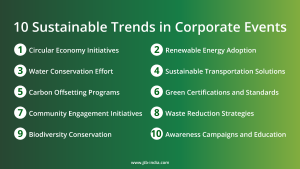Enhance Your Events with a Professional Corporate Event Planner
Corporate events are pivotal for driving business success and achieving strategic goals. These events, ranging from conferences and product launches to team-building retreats and networking galas, provide a unique opportunity for businesses to connect with their audience, showcase their offerings, and reinforce their brand identity.
The role of a corporate event planner is vital in this context, as they ensure that every aspect of the event is meticulously planned and executed to maximize impact. Corporate events are more than just gatherings; they are strategic tools that can significantly impact a company’s success. A proficient corporate event planner is essential for leveraging these opportunities to their fullest potential, ensuring that every event is not only well-organized but also aligned with broader business objectives.
What is a Corporate Event Planner?
A corporate event planner is a professional responsible for organizing and managing business-related events. Their role involves a range of tasks aimed at ensuring the event runs smoothly and meets its intended objectives. These planners work with companies to design and execute events that align with corporate goals, from conception to completion.
At the core of their responsibilities, a corporate event planner handles event logistics, including venue selection, catering arrangements, and audio-visual needs. They coordinate with various vendors and stakeholders to secure the necessary resources and services. Their role also involves creating detailed event timelines, managing budgets, and overseeing the overall event experience.
Effective corporate event planners possess strong organizational and communication skills. They must be adept at problem-solving, as unexpected issues can arise during events, requiring quick and effective solutions. Additionally, they should have a keen eye for detail to ensure that every aspect of the event aligns with the company’s brand and objectives.
In essence, a corporate event planner is more than just an organizer; they are a strategic partner who ensures that every event not only runs smoothly but also delivers on its business objectives, creating a lasting impact on attendees and stakeholders alike.
Importance of a Corporate Event Planner
The role of a corporate event planner is pivotal to the success of business events. Here’s why a skilled corporate event planner is essential:
Streamlined Coordination and Management
A corporate event planner manages all aspects of the event, including venue selection, catering, entertainment, and technology needs. Their coordination ensures that each element fits together seamlessly, reducing the risk of errors or oversights. This comprehensive management is crucial for ensuring that the event runs smoothly and meets high standards.
Expertise in Budget Management
Handling the budget for a corporate event can be complex. An experienced event planner helps allocate resources effectively, ensuring that the event stays within budget while maintaining quality. They negotiate with vendors and find cost-effective solutions without sacrificing the event’s standards. This financial oversight is essential for achieving a successful event without overspending.
Enhanced Attendee Experience
The primary goal of any corporate event is to deliver a memorable and impactful experience for attendees. Corporate event planners use their expertise to design engaging agendas, facilitate smooth logistics, and create a cohesive event atmosphere. Their attention to detail ensures that the event meets the expectations of both the company and its guests, which is vital for achieving business objectives and fostering positive relationships.
Strategic Alignment with Business Goals
A corporate event planner aligns the event with the company’s strategic objectives. They work closely with the business to understand its goals, target audience, and key messages. This alignment ensures that the event not only operates smoothly but also supports broader business objectives, such as brand reinforcement, lead generation, or team building.
Problem-solving and Crisis Management
Unexpected challenges can arise during events, from technical issues to last-minute changes. A professional event planner is skilled in problem-solving and crisis management, addressing any issues promptly and effectively. Their experience and quick thinking help maintain the event’s flow and prevent minor issues from escalating into major problems.
The importance of a corporate event planner lies in their ability to manage every aspect of the event with expertise and precision. Their skills in coordination, budget management, attendee experience, strategic alignment, and problem-solving are essential for executing successful business events that drive engagement and achieve organizational goals.
Benefits of Employing a Corporate Event Planner
Employing a corporate event planner brings numerous benefits to businesses:
- Expertise in Event Logistics: Ensures smooth execution by managing all aspects of the event, from venue selection to vendor coordination.
- Time and Stress Savings: Frees up company staff to focus on their primary responsibilities, reducing stress and workload.
- Cost Savings: Skilled negotiators can secure better deals with suppliers, potentially saving money.
- Creative Ideas and Professional Experience: Enhances the quality and impact of the event through innovative ideas and professional execution.
- Professional and Well-Organized Events: Leads to high-quality events that leave a lasting positive impression on attendees.
Disadvantages of Employing a Corporate Event Planner
While there are many benefits to employing a corporate event planner, there are also some potential disadvantages:
- Risk of Miscommunication: Misalignment can occur if the planner does not fully understand the company’s goals or culture.
- Over-Reliance on the Planner: This may lead to a lack of internal staff development in event management skills.
- Limited Internal Input: The planner may overshadow internal ideas and preferences, leading to less company-driven decisions.
How to Become a Corporate Event Planner?
Becoming a corporate event planner requires a blend of education, skills, and practical experience. Here’s a step-by-step guide to help you embark on this career path:
Obtain Relevant Education
While a specific degree isn’t always mandatory, having a background in hospitality, business management, marketing, or public relations can be beneficial. Many universities offer specialized courses in event management that provide valuable knowledge and insights into the industry.
Develop Essential Skills
Key skills for a successful corporate event planner include excellent organizational abilities, strong communication skills, and attention to detail. Additionally, being able to manage time effectively, solve problems quickly, and stay calm under pressure are crucial traits for this role.
Gain Practical Experience
Experience is vital in the event planning industry. Start by volunteering or interning at events to get hands-on experience. This can include assisting with corporate events, weddings, conferences, and other gatherings. Practical experience helps you understand the nuances of event planning and builds your portfolio.
Build a Professional Network
Networking is essential in the event planning industry. Join professional organizations like Meeting Professionals International (MPI) or the Event Planners Association. Attend industry conferences, seminars, and workshops to connect with other professionals and stay updated on the latest trends.
Get Certified
Obtaining certifications can enhance your credibility and marketability. Consider certifications such as the Certified Meeting Professional (CMP) or Certified Special Events Professional (CSEP). These credentials demonstrate your expertise and commitment to the field.
Start Small and Grow
Begin by planning smaller events to build your confidence and reputation. As you gain experience and establish a track record of successful events, you can take on larger and more complex projects.
Market Yourself
Create a professional online presence through a website and social media platforms. Showcase your portfolio, client testimonials, and case studies of past events. Effective marketing helps attract potential clients and establishes your brand in the industry.
Stay Updated with Industry Trends
The event planning industry is dynamic, with trends and best practices continually evolving. Stay informed by reading industry publications, attending workshops, and participating in continuous professional development.
In summary, becoming a corporate event planner involves a combination of education, skill development, practical experience, and networking. By following these steps, you can build a successful career in this exciting and rewarding field.
Tips to Become an Effective Corporate Event Planner
Becoming an effective corporate event planner involves mastering several key areas. Here’s a concise guide to help you excel:
Understanding the Goals and Metrics of Corporate Events
Corporate events are strategic tools used by organizations to achieve various objectives, such as enhancing brand awareness, fostering team building, or launching new products. It’s crucial to clearly define these goals and establish measurable metrics to evaluate the event’s success. Common metrics include attendee satisfaction, engagement levels, lead generation, and return on investment (ROI). By understanding these goals and metrics, event planners can design and execute events that align with the company’s strategic objectives and deliver tangible results.
Staying Updated with Corporate Event Trends
The corporate event industry is constantly evolving, with new trends emerging regularly. Keeping abreast of these trends can help organizations create innovative and impactful events. Current trends include the integration of virtual and hybrid event formats, the use of sustainable practices, and the emphasis on personalized attendee experiences. Understanding these trends enables event planners to stay competitive, engage their audience effectively, and create memorable experiences.
Leveraging Event Agencies Effectively
Event agencies can be invaluable partners in the planning and execution of corporate events. These agencies bring expertise, creativity, and resources that can enhance the quality and efficiency of events. To leverage an event agency effectively, it’s essential to communicate your goals clearly, collaborate closely throughout the planning process, and provide detailed feedback. By doing so, organizations can ensure that the agency’s efforts are aligned with their vision and achieve the desired outcomes.
You may know about JTB India’s service of Event and Meetings Management
Customizing Corporate Events
Customization is key to creating a unique and memorable corporate event. By tailoring various aspects of the event to meet the specific needs and preferences of the audience, organizations can enhance attendee satisfaction and engagement. Customization can include personalized invitations, bespoke agendas, tailored content, and unique interactive experiences. By focusing on the specific interests and requirements of the attendees, event planners can create a more impactful and resonant experience that leaves a lasting impression.
Utilizing Technology in Corporate Event Management
Technology plays a crucial role in the successful management of corporate events. Tools such as event management software, mobile apps, and virtual platforms can streamline the planning process, enhance attendee engagement, and provide real-time data analytics. Utilizing technology allows for more efficient event operations, improved communication, and a more engaging experience for attendees. Embracing the latest tech trends can also provide a competitive edge and help organizations deliver cutting-edge events.
Creating Clear and Concise Event Reports for Leadership
Reporting on the outcomes of corporate events is essential for demonstrating their value and gaining support for future initiatives. Event reports should be clear, concise, and tailored to the interests of the leadership team. Key elements of an effective report include an overview of the event, an analysis of the achieved metrics, attendee feedback, and actionable insights for future events. By presenting information in a straightforward and compelling manner, event planners can effectively communicate the success and impact of their events to decision-makers.
By following these tips, you can become a highly effective corporate event planner, capable of organizing successful and impactful events.
JTB Connect efficiently manages all the indicators required for reporting and monitors key metrics of corporate events in real-time, ensuring timely responses and accurate reporting.
Conclusion
Becoming a skilled corporate event planner is crucial for organizing successful business events. These professionals handle every detail, ensuring the event runs smoothly and meets its goals. Understanding the role, recognizing the benefits, and addressing the challenges are key steps to success.
To excel in corporate events, collaborate with industry leaders like JTB India. Our expertise and comprehensive services ensure that every aspect of your event is meticulously planned and executed. Our experience in the MICE industry and extensive network of reliable vendors contribute to creating memorable and impactful corporate events. By following tips and leveraging our expertise, you can create events that achieve business goals and leave a lasting positive impression.







